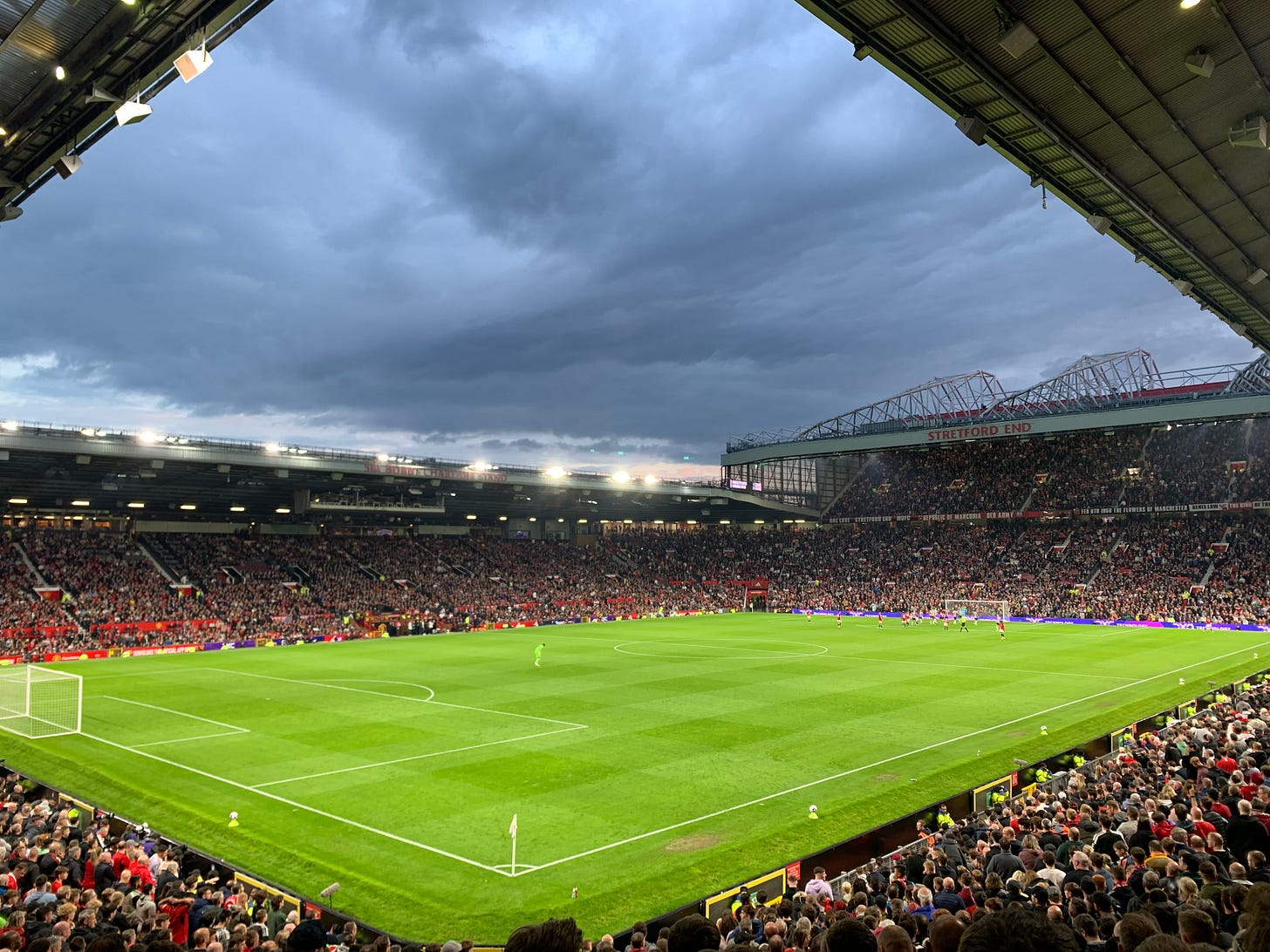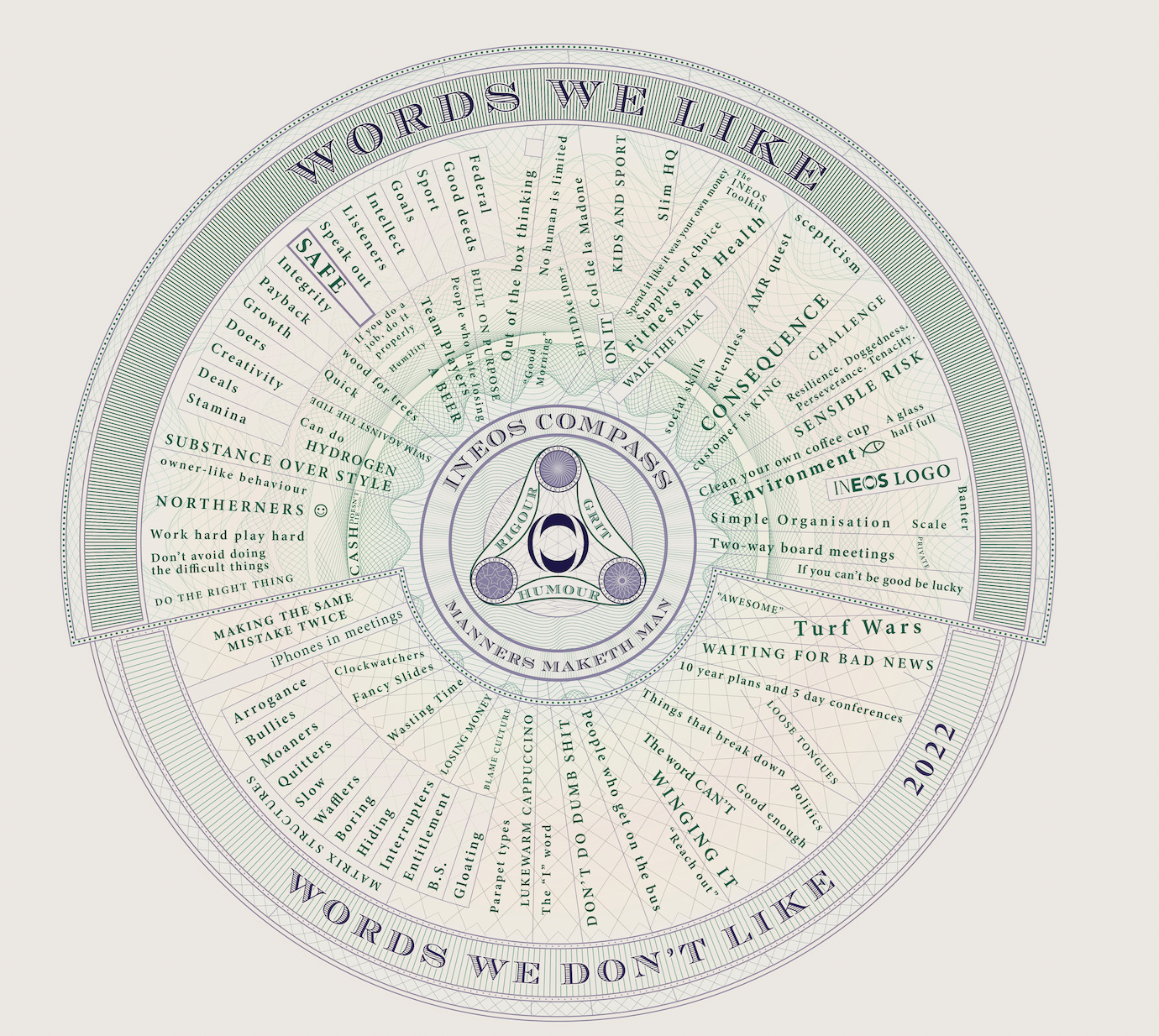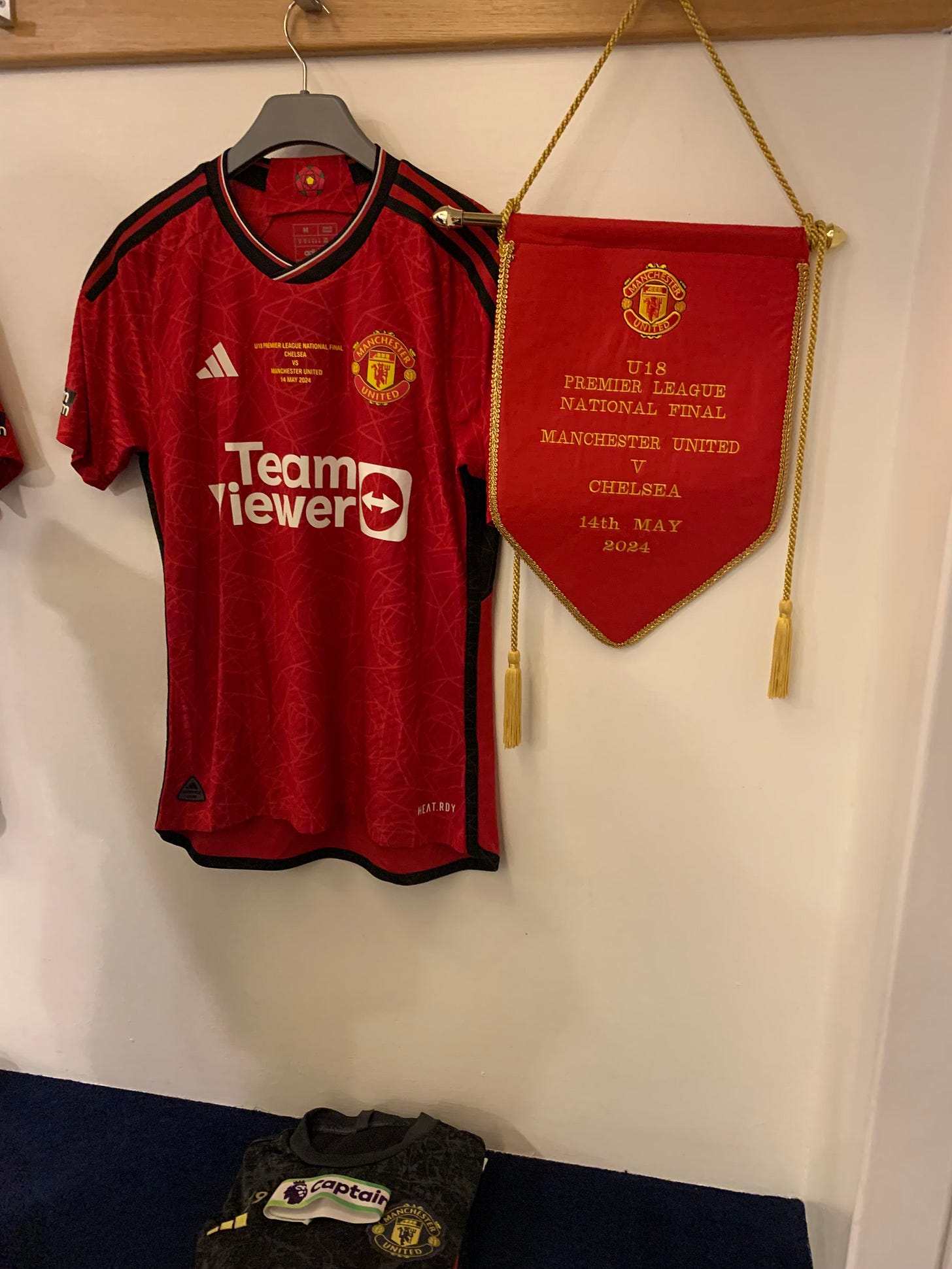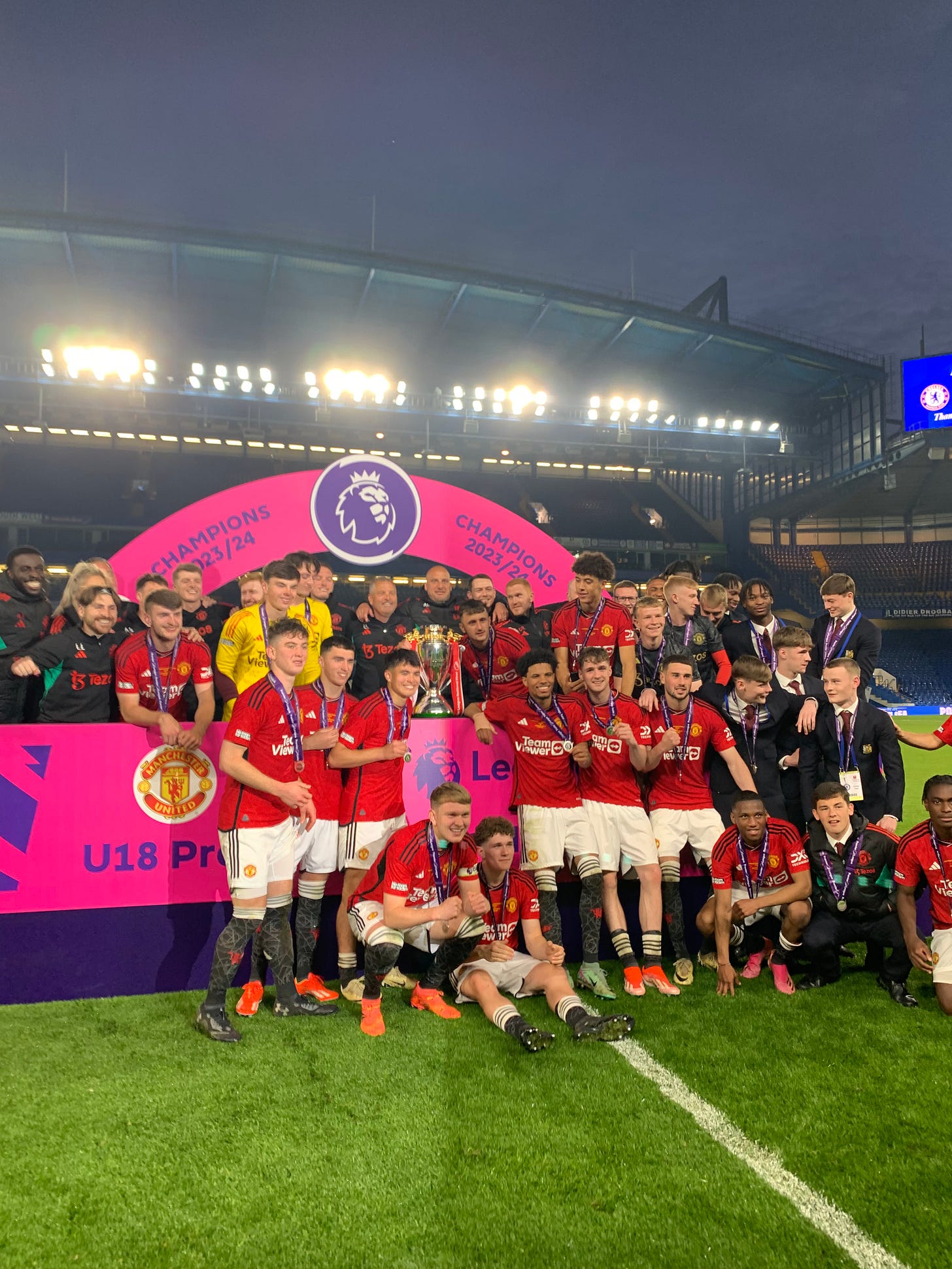Lessons for INEOS from Florentino Pérez and Real Madrid?
Harrison and Wheatley win Academy awards | Must-watch music by Playing for Change
If you’re new here: I’m Harry Robinson, a 23-year-old Stretford Ender, freelance football journalist and the author of The Men Who Made Manchester United.
What’s inside:
Every rebuild needs a beginning — lessons for INEOS from Florentino Pérez and Real Madrid?
The Academy Briefing (National champions | U21s and U18s Player of the Year)
What I’ve enjoyed recently (Incredible around-the-world music on YouTube)
1: Every rebuild needs a beginning — lessons for INEOS from Florentino Pérez and Real Madrid?
Every rebuild needs a beginning. Or at least, that’s how the books and the films will portray it. And you can imagine the way it could be dramatised, should Erik ten Hag — under the new INEOS co-ownership — achieve future success at Manchester United. Perhaps a photo of a 4-0 defeat at Crystal Palace on the wall to act as inspiration.
Ten Hag has steadied United since that season low. He looks lighter for it. Things have remained far from perfect since because while the slide has stopped, it was too late to prevent a worst-ever Premier League finish. The optimist in me nevertheless hopes that that Monday night Selhurst Park defeat may prove a defining moment. When the world was ready to pounce on another column-filling United crisis, the club’s travelling supporters demonstrated defiance. The team responded with a decent performance in defeat against Arsenal (yes, standards have dropped) and then victories against Newcastle United and Brighton to inspire faint hope of triumph in this weekend’s FA Cup final. How different things could feel by Saturday evening…
The support has remained positive in the three games since Palace and while United’s fanbase remains split on opinions about the future, a consensus among match-goers seems to be growing, that it might be preferable to stick with what we’ve got and give Ten Hag the best chance of long-term success. What really happens is up to the club’s new co-owners, whose influence and control has already expanded into areas it wasn’t expected to, away from just the football. See INEOS’ Roger Bell replacing Cliff Baty as the club’s Chief Financial Officer for one symbolic example.
With that influence comes great responsibility, and work is going on behind the scenes to enact both short and long-term change to restore United to greatness. However well INEOS have prepared for the task, I fear they’ll be struck by how tough a challenge awaits. As players past and present of United have said countless times, no one will ever understand what it takes to represent the club under global pressure until they do it. The same applies to its leadership off the pitch as on it.
In March, I wrote about the need for INEOS to answer this question before determining Old Trafford’s future: “What is really at the heart of United’s unique identity and culture?”
This obviously applies to more than just the stadium. United are — and how many times have we been able to say this over the last decade — at a crossroads. Borrowing the words of Tony Walsh in his poem on the great Jimmy Murphy: The future will be founded on the way we behave today.
The values and aspirations determined in conversations at United this week, this month and this summer will affect how soon success returns to Old Trafford. And identity must come first.
The staunch support of fans at Selhurst Park, Old Trafford (twice) and the Amex Stadium in May has once again demonstrated that winning is absolutely not all that matters. As I wrote in March, “success is a goal, not an identity, because it’s not entirely in your own hands, particularly as nation-states’ influence on elite football continues to grow.” (see Manchester City winning a fourth successive English title, despite fantastic management and performances at Arsenal)
Football owners have long had a major misunderstanding of what supporters care about. As Amazon Prime’s new documentary about the Treble season comes out, Nick Harris’ excellent newsletter featured a piece on the fight to stop BSkyB from buying United in 1998, at the start of that famous season. BSkyB’s financial backing could have helped United to even greater and more sustained heights, but supporters successfully opposed it. Winning is almost but not quite everything.
A couple of years after BSkyB’s failed bid, Florentino Pérez sat at his desk at home in Madrid and pencilled through Real Madrid’s annual reports. Just like all socios of the club, Pérez had access to these. He analysed the financial statements and budgets and deduced that the club was on a slippery slope despite winning the two UEFA Champions Leagues either side of United’s Treble. Within weeks, he’d won the election to become President of Real Madrid.
While his campaign involved the hugely dramatic signing of Luis Figo from Barcelona, at the heart of it — for him at least, but also supporters — was an acknowledgement that Real’s economic situation was being irresponsibly handled. He knew because he’d conducted polling before. The supporters responded with some key values: transparency, accountability, the will to win, sportsmanship, excellence, teamwork, a beautiful attacking style on the field, and economic responsibility.
As English football fans, we often deride the supporters at the Bernabeu for their whistling of some Real Madrid teams, even those who are winning. But really, these are fans with a firm commitment to what they believe in and who won’t accept anything less. I wouldn’t like United or the club’s support to mimic them, but it’s not simply arrogance or petulance — it is about an unwavering belief in an identity. As Steven Mandis’ book The Real Madrid Way: How Values Created the Most Successful Sports Team on the Planet details…
“Real Madrid’s community cares more about why the team exists, how their sports team wins, and whom it wins with versus “just winning (what is the result). The why and how are the critical parts and what inspire passion and loyalty. This is a fascinating idea because many sport organizations seem to rationalize actions, including the signing of players with off-field or on-field issues, under the premise of trying to give the fans what they want, which they assume is winning championships.”
With the presidency won and Figo signed, Pérez returned to his desk at home and reread the results of the polling he’d done with club supporters before his election campaign.
The questions he’d asked were along these lines:
What values do we want to serve as the foundation for our club?
What attitudes and beliefs about competition and team do you hold?
What are the goals that you want to pursue?
What do you expect from management and the team?
How do you want to be treated and communicated with?
How often do you want to be communicated with?
What kind of atmosphere and experience do you want when you attend the games?
What players (former or current) represent your ideals?
What player do you most want to join Real Madrid that is not already on the team?
He worked out the why and the how and created a mission statement, effectively a written-down charter of the club’s identity. Because much like Manchester United right now, Real Madrid employees, players and fans, Mandis writes, “seemed to know implicitly what the answers were, but they had never formally written them down. Florentino wanted to spell them out explicitly so that everyone in the community could read them and the club could be held accountable to them.”
This is what I hope INEOS will do this summer. It has to be the first step, because it defines everything that comes after.
While there is that implicit awareness of what Manchester United means to the city, the supporters and English football, United’s mission statement has been vague for some years. Much of the talk for this last decade has been about playing attacking football and winning. That isn’t an organisation-wide set of values. How can an employee in IT, security, or even media commit to playing attacking football?
“Genuine shifts in culture can be accelerated by more choreographed interventions, but are built by targeting people’s hearts and minds, or their thoughts, emotions and belief systems.” — The Making of a Leader: What Elite Sport Can Teach Us About Leadership, Management and Performance (Tom Young)
Again, success is a goal, not an identity. ‘Winning’ will drive people on. But why you win is key to “targeting people’s hearts and minds” and United have an abundant choice of whys.
There is one page on United’s website which sets out a ‘charter’ in which ‘our goal’ is “to be the best football club in the world, both on and off the pitch.” That’s a good top line, but there is no real further detail before some specifics on ticketing and a supporters’ code of conduct. The club has developed some fantastic campaigns and initiatives in recent years, connecting with fans in a variety of means. But it doesn’t feel entirely matched up. Think how much good work the people behind those positive initiatives could do with that overriding, inspiring vision.
INEOS have one of these themselves, although it comes in a different format. Sir Jim Ratcliffe’s idea was to create the ‘INEOS Compass’ as a “fun way of attempting to capture how INEOS works, and why.”
Included in ‘words we don’t like’ is ‘lukewarm cappuccino’ because ‘Jim can’t stand them!’ I would guess United’s will be a little more in keeping with the world of elite sport, which doesn’t tend to take kindly to such light-heartedness. More importantly, United’s mission statement, or sets of values, or charter, or identity — however it’s phrased — should have absolutely nothing to do with the personal wants of Sir Jim Ratcliffe, anyone from INEOS, the Glazer family, or any one individual at all. It shouldn’t just be for the supporters, or the accountants, or the players, or any one department or section of the club. It has to be all-encompassing and all-inspiring.
Every rebuild needs a beginning. Florentino Pérez started his at Real Madrid off the back of a UEFA Champions League win. His club are about to go looking for their 15th and they had eight when he took over. Ratcliffe and INEOS do not start with the same luxury, though an FA Cup might soothe the implications of an otherwise torrid season, but they’d nevertheless be well advised to follow the example of Pérez, a lifelong fan of the club who came from the world of business to restore his boyhood team to greatness on and off the pitch. Identity comes first, so, as the fans demonstrate that their support will endure throughout defeats and as the Academy continues to prove the bedrock of the club, what will United’s be? And why not ask the fans?
I’d love to hear what you think should be at the heart of United’s identity going forward so leave a comment or reply directly to this email and I’ll see!
2: Academy Briefing: U18s national champions
National champions
Manchester United U18s beat southern title winners Chelsea 2-1 at Stamford Bridge last Tuesday to become English champions.
Ethan Wheatley, confident after becoming the club’s 250th Academy graduate at the end of April, scored United’s well-deserved first with a clinical finish. Chelsea hit back shortly after half-time, rocking the young Reds temporarily but they steadied themselves and regained the lead when Ethan Williams’ converted on the rebound after Jack Fletcher’s parried shot.
Victory completes a remarkable treble for Adam Lawrence’s side after winning the northern title and the U18 Premier League Cup in April. This is a really talented side who have shown as much mental resilience and high work rate as quality on the ball.
Elyh Harrison - U21s Player of the Year
Elyh Harrison is a rare choice for the Denzil Haroun Reserve-Team Player of the Year for two reasons: one, he’s a goalkeeper, and two, he’s only 18. Kevin Pilkington is the only previous goalkeeper to win the award, back in 1995, and Harrison is the youngest recipient since Adnan Januzaj in 2013.
Signed from Stevenage two seasons ago, he was a talented prospect upon arrival and has progressed fantastically. He’s shown mental resilience on and off the pitch this season and has shone with his distribution and some excellent saves. He was my Man of the Match in the U18 Premier League Cup final, playing a role in the build-up to United’s two goals and contributing several match-winning saves late on.
It’s very well deserved for Elyh and he, his coaches and other Academy staff will no doubt be thinking about next steps. A loan move next season seems likely, perhaps more so after Christmas, giving him another few months to develop in the UEFA Youth League and Under-21s football.
Ethan Wheatley - U18s Player of the Year
The choice from the talented Under-18s squad must have been hard for United’s coaching staff. Wheatley is a good pick, and not because he became the club’s latest debutant. At the start of this season, few would have picked Ethan out as the likeliest to break into the first team. To be honest, while showing glimpses of excellence, he looked gangly and often cut a frustrated figure in games. He’d spent some time injured in both of the previous seasons. He’s developed physically and mentally, growing into a leading figure in the squad and putting in the hard yards to develop more variety to his game, stay injury-free and become a more consistent finisher.
3: What I’ve enjoyed recently:
Some brilliant music on YouTube, mainly from the Playing for Change organisation, who feature artists from across the world singing the same song. The end result is heart-warming and inspiring. Here are some picks:
(Sittin' On) The Dock of the Bay
A Change Is Gonna Come | Live in Brazil
And from other sources:
Royel Otis — Linger (The Cranberries Cover) [Live @ SiriusXM]
Declan McKenna - Slipping Through My Fingers (ABBA cover) - Radio 1 Piano Sessions
Match of the Day’s goodbye to Ian Wright. It’s so lovely to see someone who undoubtedly makes the world a brighter place experience this gratitude from friends and strangers not in the form of a eulogy. Watch here.
Previewing the FA Cup final on the latest Manchester United Weekly Podcast. Listen here.
That’s all for today. Thanks for reading. If you’ve enjoyed this, share it with a mate. And have a great rest of your week. Cheers!
My book, The Men Who Made Manchester United, is on sale on Amazon right now. You can also reply to this email for more information about £15+postage signed copies.





